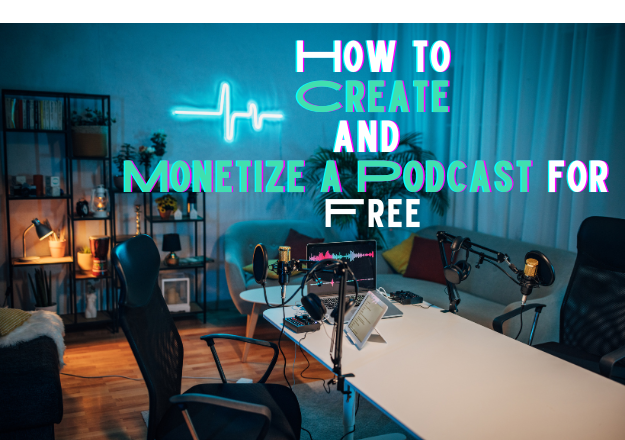How to Create and Monetize a Podcast for Free

Introduction: The Power of Podcasting
Dive into the dynamic world of podcasting, a medium that’s revolutionizing digital communication. What started as a niche form of content has flourished into a mainstream phenomenon, providing a unique way for voices to be heard. This blog will guide you on how to create a podcast for free and effectively turn this passion into profit. We’ll explore everything from concept creation to monetization strategies, equipping you with all the tools you need to launch your own successful podcast. Let’s get you heard!
Understanding What Podcasting Is
Podcasting, an influential medium of communication, is quickly cultivating a significant niche within digital media. Given its soaring popularity, understanding what podcasting is becomes paramount for content creators. Podcasts are simply digital audio or video files for downloading and streaming. They can diverge greatly in their content and structure, each serving specific audience groups. Its potential is immense, ranging from content promotion to lessons, storytelling, and even evolving into a commercial enterprise. Its success, however, hinges on factors like creativity, relevance, and consistency.
Step 1: Develop Your Podcast Concept
Commencing your podcast journey involves careful conceptualization. Your chosen theme and niche should be unique and relevant, captivating potential listeners. Continuity in design and content enhances your credibility and keeps your audience hooked. Your target audience should guide your content, adjusting aspects to their preferences. An interesting format—an in-depth interview series, investigative storytelling, or relaxed chats, as examples—can significantly distinguish your podcast, giving it a competitive edge.
Step 2: Creating Interesting Content for Your Podcast
Creating compelling content for your podcast requires a multifaceted approach. Effective scriptwriting is foundational, infusing guest interviews and storytelling can amplify engagement. Leverage current events and hot topics to generate timely discussions while continually evolving your show for relevance. Regularly seek listener feedback, as it can offer fresh perspectives and critical insights into audience preferences and promotion of potential content improvements. Ultimately, delivering relevant and captivating content is synonymous with successful podcasting.
Step 3: Free Podcast Recording Software Options
There are various free software options available, each with unique features suited to different podcasting needs. For instance, Audacity is a popular choice among beginners because it’s user-friendly and compatible with different operating systems. Similarly, GarageBand is favored by Mac users due to its rich music creation features. Zencastr allows you to record high-quality audio and video with multiple people. Using these tools, you can make professional-sounding podcasts without spending a dime.
Step 4: How to Record a Podcast for Free
To record a podcast for free, choose one of the many available software options and follow its detailed guide. These platforms offer a range of features like multi-track recording and audio editing. Since each platform is unique, choose one that matches your specific requirements. Get acquainted with its interface and workflow by playing around with its features before you begin recording. This way, you can produce a high-quality podcast without having to invest in expensive equipment or services.
Step 5: Essential Tips for Podcast Quality Enhancement
Improving your podcast’s quality relies heavily on perfecting its audio. Investing some time to understand your microphone’s usage and perfecting your skills to capture pristine audio can add an exponential value to your podcast. Also, mastering blending various audio sources together smoothly can provide your listeners with a seamless listening experience. For example, transitioning smoothly between the intro, the guest’s audio, and the outro creates an enhanced professional touch.
Step 6: How to Upload a Podcast Online for Free
To publish your podcast for free, you can leverage a variety of online platforms. Firstly, identify some reputable, free podcast hosting platforms like Anchor, Buzzsprout or Podbean. Evaluate their offerings, understanding their pros, cons, and whether they suit your objectives. Each platform offers unique features, so choose one that aligns best with your podcast’s theme, audience, and goals. Uploading your podcast to these platforms can be a straightforward process, often just requiring some basic details and your podcast file.
List of Free Podcast Hosting Platforms
There are numerous reputable free podcast hosting platforms from where budding podcasters can start their journey. Each platform comes with its unique advantages and disadvantages. For instance, Buzzsprout is quite user-friendly, offers advanced analytics, and has automatic episode optimization. But the free plan limits your uploads and deletes your episodes after 90 days. Spreaker provides unlimited storage, yet the basic plans limit your episode length. Understanding each platform’s pros and cons helps in choosing the right platform for your needs.
Step 7: How to Distribute Your Podcast
After uploading your podcast, it’s essential to distribute it for broader reach. Don’t limit your podcast only to your website or hosting platform. Utilize popular podcast streaming platforms like Apple Podcasts, Spotify, and Google Podcasts. Make sure to create an RSS feed for your podcast as this allows listeners to subscribe and automatically receive new episodes. Additionally, promoting your podcast on social media networks can help increase visibility, attract new listeners, and drive listener engagement.
Understanding Podcast Monetization
Podcast monetization refers to methods of generating revenue from your podcast; this includes strategies like securing sponsorships, affiliate marketing, creating and selling online courses, or utilizing donation platforms like Patreon. It’s beneficial to have a diverse monetization scheme: one could reach out to potential sponsors and pitch your show to secure deals; integrate affiliate links throughout your podcast for commissions; create online courses based on podcast content; or allow loyal listeners to support your work through Patreon.
Getting Started with Podcast Sponsorship
To initiate podcast sponsorship, it’s crucial to identify potential sponsors interested in your show’s niche. Develop an enticing pitch about your program, highlighting its unique content, engaged audience, and potential advertisement value. Landing successful sponsorship deals can be a game-changer, providing a valuable revenue stream for your podcast. It’s important to negotiate an agreement that is beneficial for both parties, which could be a per-episode sponsorship or a contract based on the number of listeners.
How to Monetize a Podcast through Affiliate Marketing
To generate income through affiliate marketing, podcast creators can incorporate affiliate links into their content. This involves promoting a product or service and receiving a commission for drives sales. For instance, during an episode, you could discuss a book relevant to your topic and include a link for listeners to purchase it. Each purchase made through your unique link would earn you a portion of the sale. Promoting items that align with your podcast branding and audience interest facilitates monetization without jeopardizing content integrity.
Podcast Monetization through Online Courses
Creating online courses is a powerful way to monetize your podcast. As a podcaster, you hold a unique opportunity to transform your podcast content into an in-depth course for your listeners. For example, if your podcast series is about DIY home improvement, you can design an online course teaching those skills in detailed modules. The trick lies in identifying a topic that resonates with your audience and developing it into a comprehensive learning path. You then monetize this course, providing an additional revenue stream while offering immersive value to your audience.
Using Donations Platforms for Podcast Monetization
Donation platforms like Patreon form an integral part of podcast monetization strategies. They bridge the gap between content creators and supporters, allowing listeners to contribute financially towards your podcast. Offering exclusive content or perks for donors can enhance this model. The donations are voluntary, depending on listeners’ desire to support your work, which increases the likelihood of earning as per your content quality and listeners’ generosity. This method is a significant part of balancing the costs associated with sustaining quality podcasting while keeping it freely accessible.
Pros and Cons of Free vs. Paid Podcasting
Exploring both free and paid podcasting options is vital. The significant advantage to free podcasting is certainly the cost effectiveness, ideal for newbies without a huge budget. However, with this comes challenges, including fewer features, slower upload times, and storage limitations. Meanwhile, paid platforms offer more functions like marketing features, advanced analytics, or larger storage. But of course, these come at a financial cost. Thus, contemplate your requirements, abilities, and resources when choosing between free and paid podcasting options.
Promoting Your Podcast to a Wider Audience
Boosting your podcast’s visibility is key to expanding its reach. To do this, utilizing search engine optimization (SEO) will help you attract organic listeners. Promoting your podcast across various social media channels can also help raise awareness and increase followers. Look into collaborating with other podcasters to cross-promote each other’s work. These partnerships can foster mutual growth, with each person tapping into the other’s audience base. Engaging in these practices can widen your community and potentially increase your potential for earning.
Common Challenges in Podcast Creation and Monetization
The journey of podcast creation and monetization isn’t without its hurdles. Creators often grapple with maintaining consistency in content output – finding new topics, ensuring relevance, and retaining listener interest. Gaining and managing sponsors can also be daunting, especially for newcomers, requiring strategic pitching and building a loyal audience base. Additionally, balancing quality and costs is necessary to ensure profitability. For instance, creators might struggle to achieve professional-grade audio quality on a shoestring budget. These challenges are ubiquitous yet surmountable with the right tools and approaches.
How to Overcome Podcasting Challenges
Tackling challenges in podcast creation and monetization is an integral part of the journey. To overcome hurdles such as producing consistent and engaging content, it’s vital to create a content calendar and consider using guest speakers. Finding sponsors can seem daunting, but by tailoring your show to the interests of your target audience, potential sponsors will be more likely to invest. Also, manage your costs effectively by leveraging free podcasting tools whenever possible. Stay persistent and adaptable to successfully navigate the podcasting landscape.
Conclusion: A Stepwise Approach to Podcast Creation and Monetization
To wrap up, creating and monetizing a podcast involves several steps and strategies. It starts with a powerful concept and engaging content, uses free tools and platforms, and leverages multiple monetization avenues. While challenges may surface, understanding SEO, audience-catering techniques, and overcoming hurdles ensures a sustainable model for free podcasting. Firmware evolution and the rising popularity of this medium render it a potent contender in the digital landscape.




